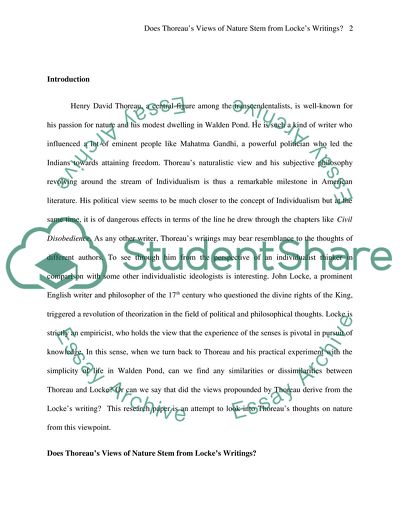Cite this document
(Does Thoreaus Views of Nature Stem from Lockes Writings Essay - 1, n.d.)
Does Thoreaus Views of Nature Stem from Lockes Writings Essay - 1. https://studentshare.org/philosophy/1789176-thoreaus-views-of-nature-is-primarily-subjective-in-which-he-identified-himself-as-a-part-of-nature-whereas-those-of-darwin-and-locke-are-objective-in-that-they-observed-and-studied-nature
Does Thoreaus Views of Nature Stem from Lockes Writings Essay - 1. https://studentshare.org/philosophy/1789176-thoreaus-views-of-nature-is-primarily-subjective-in-which-he-identified-himself-as-a-part-of-nature-whereas-those-of-darwin-and-locke-are-objective-in-that-they-observed-and-studied-nature
(Does Thoreaus Views of Nature Stem from Lockes Writings Essay - 1)
Does Thoreaus Views of Nature Stem from Lockes Writings Essay - 1. https://studentshare.org/philosophy/1789176-thoreaus-views-of-nature-is-primarily-subjective-in-which-he-identified-himself-as-a-part-of-nature-whereas-those-of-darwin-and-locke-are-objective-in-that-they-observed-and-studied-nature.
Does Thoreaus Views of Nature Stem from Lockes Writings Essay - 1. https://studentshare.org/philosophy/1789176-thoreaus-views-of-nature-is-primarily-subjective-in-which-he-identified-himself-as-a-part-of-nature-whereas-those-of-darwin-and-locke-are-objective-in-that-they-observed-and-studied-nature.
“Does Thoreaus Views of Nature Stem from Lockes Writings Essay - 1”. https://studentshare.org/philosophy/1789176-thoreaus-views-of-nature-is-primarily-subjective-in-which-he-identified-himself-as-a-part-of-nature-whereas-those-of-darwin-and-locke-are-objective-in-that-they-observed-and-studied-nature.


